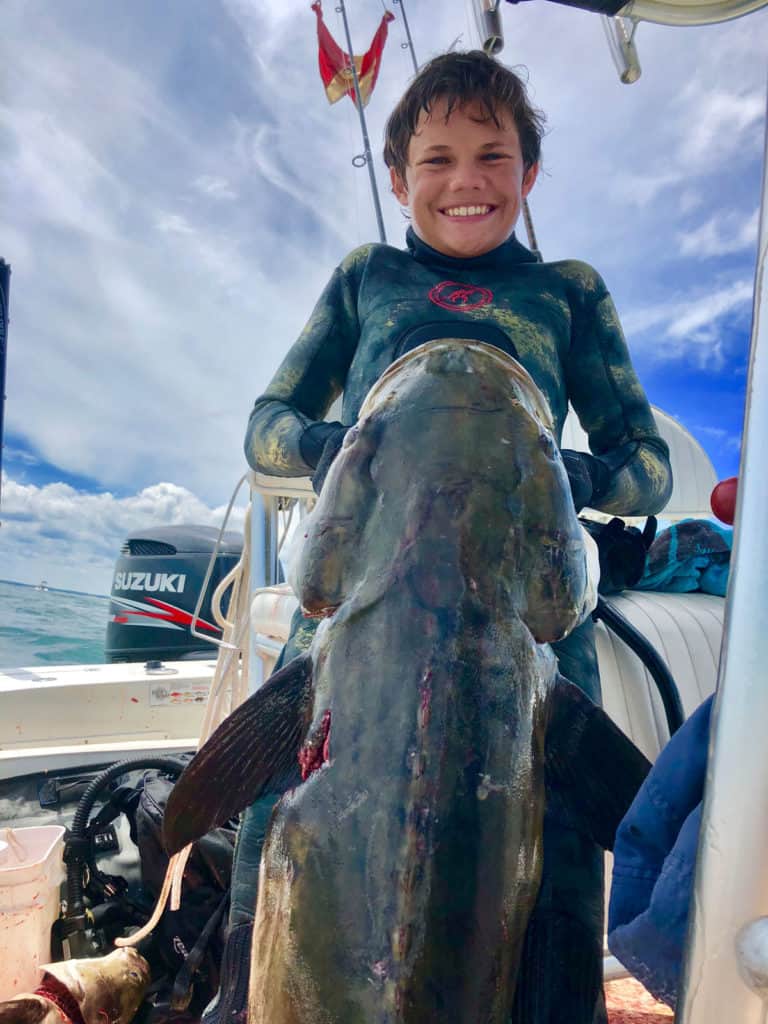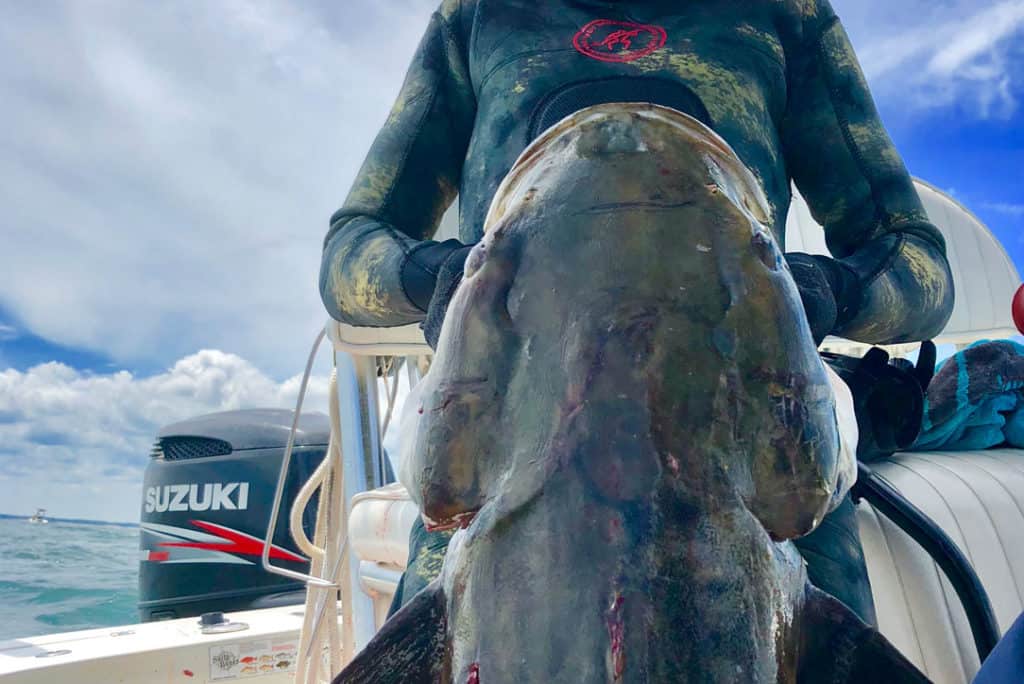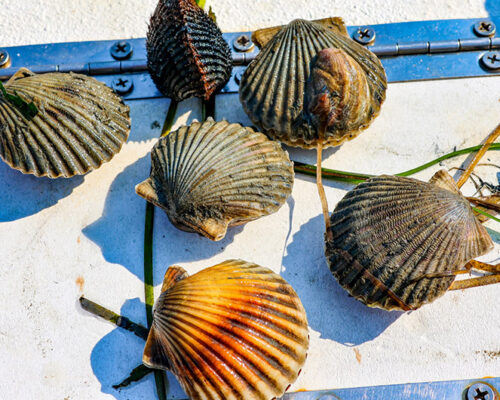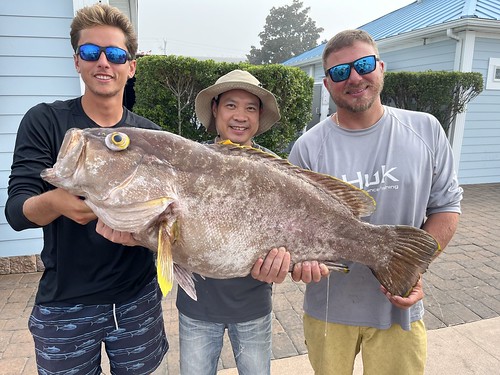by Captain Chris D. Dollar
Like most anglers, I prefer to stay in the boat. Spear-fishermen have a very different perspective. They get their kicks by swimming with the fishes—literally, not Godfather-style. While shore- and boat-bound anglers use rods, reels, lures and bait, submariner fishing people use spear guns. Air-breathing anglers can eat fried chicken, hard-boiled eggs, and talk trash among ourselves while fishing. Free divers must hold their breaths. Oh, and despite the fact you’ve got a lethal weapon and a big brain, once your head goes below the water, you’ve dropped from the top of the food chain.
Free diving our local waters in pursuit of game fish is doable but risky. I’ve snorkeled the Chesapeake’s lush underwater grass beds of Tangier Sound, Poquoson Flats, and Eastern Bay, but my spear fishing experience has been confined to two outings—once in the Gulf of Mexico around a retired oil derrick platform and a magical, week-long excursion in the Bahamas.
The Gulf dive was exhilarating and exhausting, as heavy seas and currents pushed me against the massive steel and concrete pillars. It made for a hairy ordeal, but if your heart ain’t racing at times, how do you know you’re alive? In contrast, the gin-clear Caribbean waters where I used a Bahamian sling to pursue reef-dwelling fish and spiny lobsters, provided an incredible kaleidoscope of marine life right up until the moment a six-foot blacktip shark decided it was more deserving of my speared hogfish and chased me down to prove it. The speed at which that apex predator closed the gap was surreal, and the scene sticks with me in full Technicolor to this day. I sure hope it enjoyed that meal.
The spearfishing community in our region is small but passionate. I wanted to learn more. Not so much about the where, (dive shops, the Ocean City Reef Foundation, and fishery state agencies can help with that), but the why. I wanted to know about the experiential nature of the sport. I reached out to a few folks who know their stuff
Juan Franzetti is an experienced spear-fishermen from Ocean City, Maryland. His main dive partner is his sixteen-year old son Lucas. They’ve explored the subaquatic world together ever since Lucas learned to swim. They have spearfished in many places along Delmarva as well as in Belize and Brasil. Juan’s highlights include watching a 13-year-old Lucas shoot his first cobia and the time he filmed him shooting dolphin offshore. Juan also shared that this is a very dangerous sport:

“First and foremost, find a certified free diving instruction course and take it. It will teach you how to be a better diver, but more importantly, it will show you how to be a safe diver and what to do in case of an emergency—like a shallow-water black out, which can be deadly,” he advised. “Then I would recommend getting started in a warm climate with clear water until you get some experience as local [Mid-Atlantic] waters can be intimidating for beginners.”
Other experienced spear-gunners I spoke with shared similar advice and underscored that it isn’t a sport for everyone. Remaining calm under stress and anxiety so that you can hold your breath is, of course, paramount but not easy, especially in murky water. There are sharks, of course, and when they show up, Frenzetti says, “it takes a lot longer to get out of the water! Just last year we saw several juvenile great whites in one day.” Additionally, you may have to contend with other boats that don’t respect dive flags and strong currents.
Virginia Beach resident Kevin Grunert tells me that his “spearfishing footprint is the Delaware Bay to Topsail Beach, North Carolina. The Chesapeake Bay Bridge Tunnel is a great spot. However, any dock, rock, or breakwater will hold fish. The best shore dive wrecks are the, USS Huron, USS Oriental, and the Triangle Wreck. All are on Google maps.”
He says one of the hardest adjustments is finding the gear that’s right for you.
“I recommend borrowing gear and snorkeling. If they found that interesting, one would take it a step further and purchase entry level gear, and then find a mentor,” he suggests. “Beginners should not strike out on their own—unless they want to be crab food.”
To him, spearfishing allows for a special connection to nature, and it is humbling and even scary at times. “I enjoy the feeling of accomplishment from providing myself with my own food. It also has a nostalgia to it, since I share the sport with my family. We stay connected through it,” he adds.
I reached out to Marty Gary, my colleague in the fishery conservation world who is the executive secretary for the Potomac River Fishery Commission. He’s an experienced scuba diver, having done many dives in the Chesapeake and off Ocean City’s coast. In his youth, he spent summers with family in South Florida and the Keys. In those pristine waters, his cousins taught him to free dive for lobsters and reef fish. Observing fish behavior proved to be an enriching experience that helped put him on the path to his career as a fisheries ecologist.
“In the Keys, I learned to appreciate the ability of fish to use their chromatophores [skin pigments] to cryptically change color and use structure for protection. It made the challenge of finding and spearing them more intriguing,” he told me. “Spearfishing off the Delmarva coast or in the Chesapeake requires similar skills for species such as tautog, black sea bass, and summer flounder. The first two are masters at using structure such as shipwrecks to hide, and the latter can blend in with any bottom, sand or silt.”
These days, he’s more content to shoot a fish with a camera than a spear, but he suggests that we can learn more about fish from spending time with them underwater than we can from reading a textbook.
When we reach the other side of this pandemic, there will be magical places to visit and amazing fish to catch. And who knows? I may jump at the chance to swim freely in the open ocean or Chesapeake untethered from the laws of gravity and ravages of unseen viral monsters. Even if it means sharing those waters with marine monsters. At least I can see those coming.
Spearfishing Rules
Virginia
- Requires a saltwater fishing license.
- It’s unlawful to harvest fish for commercial purposes by any method of spearfishing.
- It’s unlawful to catch or possess sturgeon
- It’s unlawful to possess a lobster that has a speared outer shell.
- It’s unlawful for any person to take a shark with any gear other than handline or rod and reel.
- For all other species of finfish, recreational possession and size limits apply.
Maryland
- Must have a retrieval line attached.
- May not spearfish within 100 yards of any human being, private or public swimming area, international diving flag, occupied duck blind, or vessel other than the vessel occupied by the individual using the projectile gear.
- The distance restrictions will not apply if the individual receives permission from the affected parties prior to using the projectile gear.
- May not be used to fish for any trout species, walleye, striped bass, striped bass hybrids, northern pike, muskellunge or muskellunge hybrids including tiger musky, largemouth and smallmouth bass, snapping turtles, shark species, lobster, or any threatened or endangered species.




